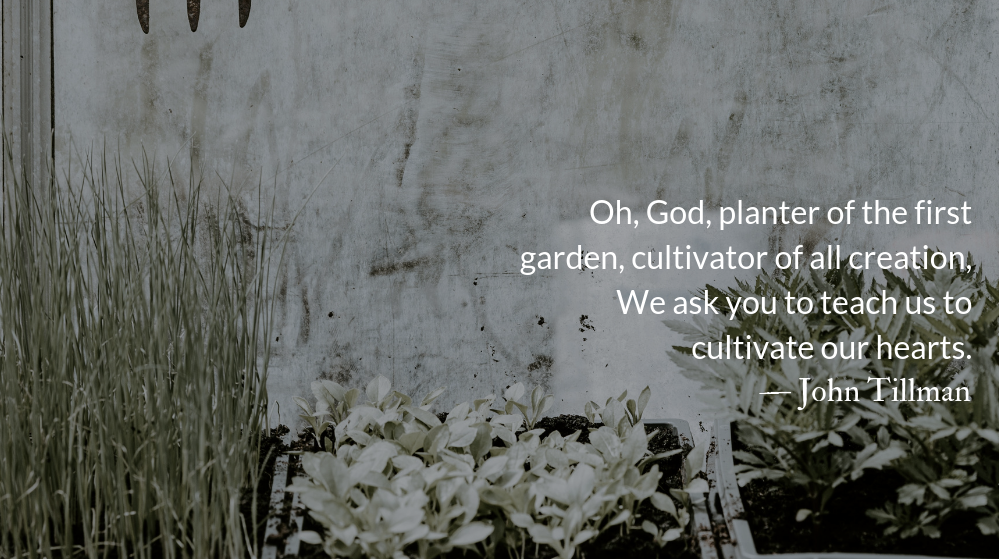Matthew 15.13
He replied, “Every plant that my heavenly Father has not planted will be pulled up by the roots.”
Reflection: For Sustainable Cultivation :: A Guided Prayer
By John Tillman
A growing faith that produces a sustainable harvest is one that is cultivated.
Faith that produces harvest is supernatural. It has a purposeful and planned rhythm. It starts with the destruction of clearing obstacles. It continues with protection and tender care for the young plants. It multiplies with growth and harvest that is shared among community. It propagates through seeds of knowledge, passed on for the next generation of growth.
As we conclude (for now) our series on cultivating faith, we pray over our hearts (our fields) some scriptures from today’s readings.
A Prayer to the Sustainer of Faith
Oh, God, planter of the first garden, cultivator of all creation,
We ask you to teach us to cultivate our hearts.
Isaiah was right when he prophesied about you:
“‘These people honor me with their lips,
but their hearts are far from me.
They worship me in vain;
their teachings are merely human rules.’”
We do not want our hearts to be far from you, Lord.
We do not wish to cultivate a system of human rules,
But a harvest of the fruit of your Spirit.
But the things that come out of a person’s mouth come from the heart, and these defile them. For out of the heart come evil thoughts—murder, adultery, sexual immorality, theft, false testimony, slander.
You have taught us, Lord, that the fruits of our actions spring from our hearts.
Our hearts are the fields that we must till and tend.
He replied, “Every plant that my heavenly Father has not planted will be pulled up by the roots.
Help us, Lord, to resist the urge to weed someone else’s field.
We pray that you would send us, Lord, first into the field of our own hearts.
To pull up the stones.
To burn out the crops of selfishness.
To pull up by the roots our callousness.
To nourish the good seed of the gospel.
To share the harvest in celebration.
Only then, Lord, will be able to give freely to our neighbors of the seed that you have planted in us.
We echo the cry of the outcast Syro-Phonecian woman, Lord.
Lord, Son of David, have mercy on me!
We are desperate for a crumb of the harvest of the gospel.
And we long to hear you answer,
You have great faith! Your request is granted.
Prayer: A Reading
Jesus taught us, saying: “Whoever holds my commandments and keeps them is the one who loves me; and whoever loves me will be loved by my father, and i shall love him and reveal myself to him.” — John 14.21
– Prayer from The Divine Hours: Prayers for Autumn and Wintertime by Phyllis Tickle.
Prayers from The Divine Hours available online and in print.
Today’s Readings
Genesis 16 (Listen – 2:18)
Matthew 15 (Listen – 4:23)
Are you interested in joining an online community to share with The Park Forum readers? Email us at: info@theparkforum.org
Read more about Kingdom Manifestation :: A Guided Prayer
There is a kind of sin-sickness that we nurse and maintain. Pray that it be healed. Ask for your eyes to be opened as your blindness is revealed.
Ask to be raised to new life.
Read more about Meals Together, Forgiveness to Go
Christ’s breakfast on the shore is a model for us of gathering those who have failed, reinstating each other through Christ’s redemption, and being sent out to feed others.







